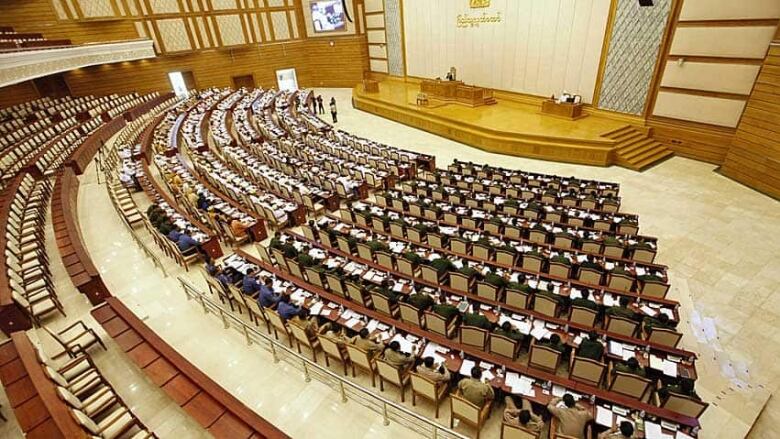EU suspends Burma sanctions, citing progress
Suu Kyi boycotts opening of parliament over oath-of-office wording

The European Union suspended its sanctions against Burma on Monday for a year in response towidely praised political reforms in the country, but it will retain an embargo on arms sales.
The EU wants to support the progress made in the southeastern Asian nation "so it becomes irreversible," said foreign policy chief Catherine Ashton. She will travel to Burma, also known as Myanmar, this week.
The measure were adopted by the bloc's foreign ministers at a meeting in Luxembourg, said spokeswoman Maja Kocijancic. Sanctions currently target more than 800 companies and nearly 500 people, and include the withholding of some development aid.
European and U.S. officials have pointed to significant reforms in Burma over the past year. These include more freedom for the media and political opposition parties, and the election to Parliament of former political prisoner Aung San Suu Kyi, whose arrest originally drove the imposition of the penalties.
British Foreign Secretary William Hague highlighted the fact that sanctions were being suspended rather than lifted completely.
"We remain very concerned about conflict and human rights abuses in some ethnic areas of Burma," Hague said.
The effectiveness of U.S. and EU sanctions has been undermined by China, India and Southeast Asian nations that maintain flourishing business ties with Burma. EU nations are concerned that they are lagging behind in both the political and economic fields as Burma increasingly opens up.
Suu Kyi boycotts parliament
Suu Kyi herself and the other newly elected lawmakers in Burma's leading opposition party boycotted parliament Monday, but party officials expect their dispute over the oath of office to be resolved soon.
The National League for Democracy party objects to phrasing in the lawmakers' oath that says they must "safeguard the constitution," which they want amended because they say it gives too much power to the military.
The absence from parliament of Suu Kyi and 42 other elected lawmakers who won historic April 1 byelections was expected, and her party says they will not attend until the dispute is resolved.
Suu Kyi's party wants the phrasing "safeguard the constitution" changed to "respect the constitution." The party says that phrasing was changed in the party registration law last year and other relevant laws should be changed as well.
Expected to attend
Opposition lawmaker Ohn Kyaing confirmed the opposition's refusal to attend, and no party members were present Monday when the upper house began its session in the capital Nyapyitaw. But Ohn Kyaing said Sunday he believed the issue would be overcome quickly because there was support within President Thein Sein's administration to change the oath.
Party officials have played down the problem, saying they still expect the lawmakers to attend the assembly, possibly this week or next.
The oath is in an appendix to the constitution, and it is unclear whether it can be changed without the approval of 75 per cent of parliament.
The constitution automatically allocates 25 per cent of the parliamentary seats to unelected representatives of the military, and Suu Kyi's party maintains that is undemocratic.
The document also bars people from the nation's presidency if they or any of their relatives are foreign citizens; that effectively prevents Suu Kyi from ascending to the presidency because she married a British national, Michael Aris, who died in 1999, and their two children were born abroad and do not live in Burma.
Thein Sein has overseen a wave of political reforms since taking office a year ago, and analysts say his administration needs the opposition in parliament to gain international legitimacy.
The byelection's outcome, in which the opposition won almost all of the 45 seats up for grabs, was considered a major step toward reconciliation after decades of military rule in Burma.
Wooing Suu Kyi's party to rejoin politics after it boycotted the 2010 election was a key turning point in the government's campaign for Western economic sanctions imposed during military rule to be lifted.












_(720p).jpg)


 OFFICIAL HD MUSIC VIDEO.jpg)
.jpg)



























































































